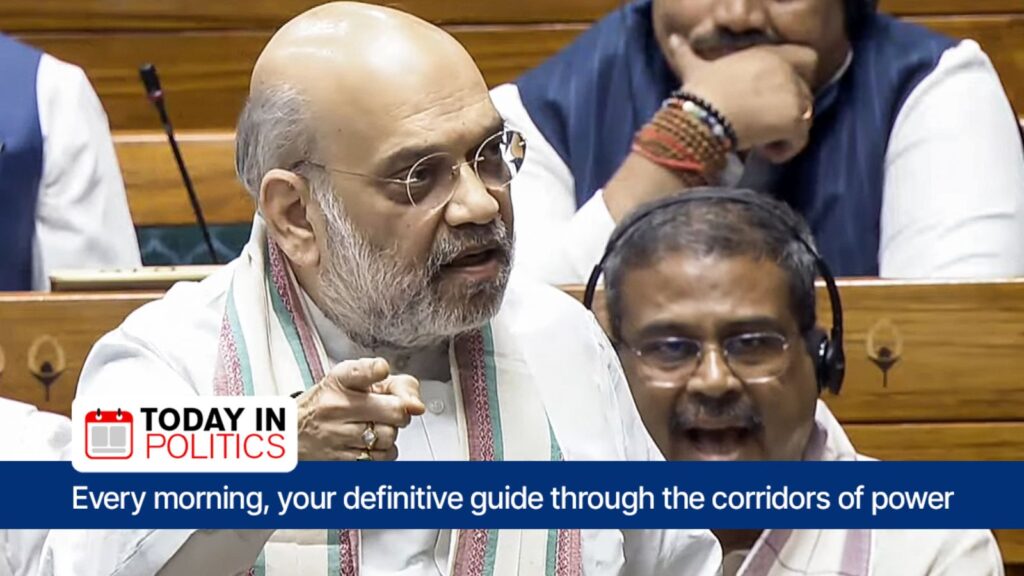After a day-long discussion in the Lok Sabha on the Pahalgam terror attack and Operation Sindoor, the special debate continues in the House on Tuesday. Among the big guns from the Opposition who are expected to address the Lower House are the Gandhi siblings, Leader of Opposition Rahul Gandhi and Wayanad MP Priyanka. At the same time, Union Home Minister Amit Shah is expected to address the House from the government side.
The speakers from the Opposition have, by and large, focused their attacks on the alleged security lapses and intelligence failure, the alleged role the US government led by Donald Trump played in the ceasefire declaration, and the aircraft the Air Force lost in the May 7-10 military offensive against terror infrastructure in Pakistan.
The government countered by saying that the Opposition was asking the wrong questions — this was the crux of Defence Minister Rajnath Singh’s remarks, as Vikas Pathak reported — and clarified there was no link between the trade talks with the US and the halt in military operations against Pakistan.
The Rajya Sabha, meanwhile, will start the debate on Tuesday. What punches the two sides land in the two Houses will be among the top political stories of the day.
SC on Presidential reference
The Supreme Court will take up the reference made to it by the President under Article 143 of the Constitution, following the court’s April 8 verdict setting a three-month deadline for the President and Governors to act on Bills passed by state Assemblies. Under Article 143(1), the President may refer a “question of law or fact” to the Supreme Court for its opinion. The opinion, unlike a ruling, is not binding.
On Tuesday, a five-judge Constitution Bench led by Chief Justice B R Gavai is likely to decide the schedule of the hearings, which are expected to begin sometime in the middle of August. The Tamil Nadu government has moved the court, urging it to declare the Presidential reference as not maintainable and return it as unanswered. It labelled the Presidential reference an “appeal in disguise”.
As Apurva Vishwanath quite lucidly explained in this article, in its 1991 opinion on the Cauvery Water Disputes Tribunal, the court said Article 143 was not a mechanism for the executive to seek review or reversal of its established judicial decisions. The government can, however, file for a review of the April 8 ruling and move a curative petition in an attempt to reverse it.
Story continues below this ad
Assam eviction drive
The Assam government is gearing up to conduct one of the biggest eviction drives of late, in eastern Assam’s Golaghat district, reports Sukrita Baruah. Officials estimate that around 15,000 bighas (around 4,900 acres) of land in the Rengma Reserve Forest in the Uriamghat area of Golaghat will be cleared of “encroachers” over two phases, with the first phase scheduled for Tuesday. Around 2,700 families, mostly Bengali-origin Muslims, live on this land.
The Himanta Biswa Sarma government’s eviction drive has been politically contentious, given that it comes at a time when the Mamata Banerjee government and the Trinamool Congress (TMC) have mobilised over the alleged mistreatment of Bengali migrant workers in various BJP-ruled states, including Assam, framing it as “linguistic terrorism”. Assam’s neighbouring states, too, are on guard about the possible influx of undocumented migrants into their territory and have heightened vigil in the border districts, Sukrita reported last week.
To know how these eviction drives play out, affecting people’s lives, read Sukrita’s ground report from earlier this month: ‘Even if you cry, your house won’t be spared’: Inside Assam’s latest mega eviction drive
© The Indian Express Pvt Ltd


